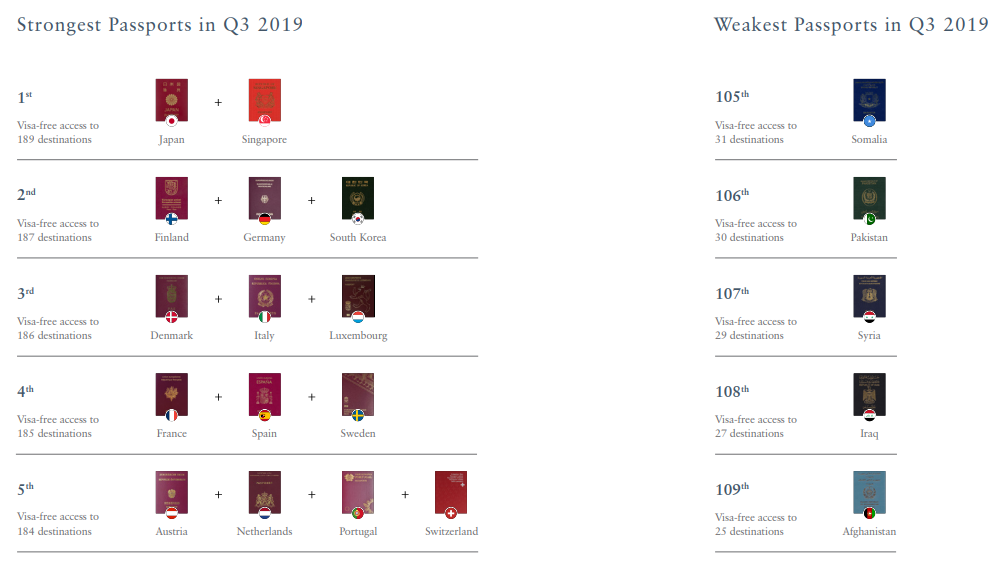Falling from the first place spot it shared with Japan and Singapore last quarter, South Korea now sits in second place on the index along with Finland and Germany, with citizens of all three countries able to access 187 destinations around the world without a prior visa. Finland's ascent from third to second place is due to recent changes to Pakistan's formerly highly restrictive visa policy.
In the hope of attracting tourists and boosting its struggling economy, Pakistan now offers an ETA (Electronic Travel Authority) to citizens of 50 countries, including Finland, Japan, Malta, Spain, Switzerland, and the United Arab Emirates.
This concession does not extend to either the UK or the US. With a visa-free/visa-on-arrival score of 183, the UK and the US now share sixth place - the lowest position either country has held since 2010, and a significant drop from their first place spot in 2014.
Denmark, Italy, and Luxembourg sit jointly in third place on the index, each with a visa-free/visa-on-arrival score of 186, while France, Spain, and Sweden are in joint fourth place, each with a score of 185.

In significant shifts elsewhere in the rankings, the United Arab Emirates (UAE) has entered the index's top 20 for the first time in the index's 14-year history, with a visa-free/visa-on-arrival score of 165.
Over the past five years, the UAE has more than doubled the number of destinations its citizens are able to travel to without a prior visa. Over the past ten years the country has risen 41 places in the ranking, the largest rise of any nation across the world. Albania, Taiwan, Bosnia and Herzegovina and Serbia have also risen more than 20 places over the same period.
At the other end of the scale, Nigeria has seen the largest fall, slipping 31 positions over the past ten years, just ahead of Sierra Leone and Bangladesh, which have fallen 29 and 28 places respectively. Syria, Mali, Niger and Senegal are also significant fallers.
Afghanistan remains at the bottom of the global mobility spectrum, with its citizens able to access only 25 destinations worldwide without a prior visa. Iraq is just ahead with 27 accessible destinations, followed by Syria (29 countries), Pakistan (30 countries) and Somalia (31 countries)
The Henley Passport Index claims to be the most reobust index of its kind, but is among a number of measures now available to reference passport power. This latest update is based on a total of 199 different passports against 227 different travel destinations, including countries, territories, and micro-states.
Political science researchers have found that that there is a link between visa-openness and progressive reform, and that a county's ranking on the index reveals far more than simply the number of destinations its holders are able to access.
"With a few notable exceptions, the latest rankings from the Henley Passport Index show that countries around the world increasingly view visa-openness as crucial to economic and social progress," says Dr Christian H Kaelin, chairman of Henley & Partners and the creator of the passport index concept.
"Discussions of passport power and global mobility tend to focus on the benefits for the countries with the strongest passports. However, this latest unique research appears to confirm something that many of us already knew intuitively: that increased visa-openness benefits the entire global community, and not just the strongest countries," he adds.
Here's the standout performers from among other regions from the latest update…
- Africa: The Seychelles, Mauritius, and South Africa, respectively, continue to hold the top three spots. The Seychelles and Mauritius are the only African countries to have made gains in their scores over the past decade. South Africa has dropped 19 places in that period, as has Kenya.
- Middle East: The UAE remains in first place, with Israel in second and Turkey in third. The UAE and Israel are the only two countries in the region to have made gains in their scores over the past decade. Iraq, Syria, and Yemen have all dropped 20 or more places during that period.
- Caribbean: The top three spots are held by Barbados, the Bahamas, and St Kitts and Nevis, respectively. A number of Caribbean countries have made strong gains over the past decade. The Bahamas and St Kitts and Nevis have both climbed 12 places, while Antigua and Barbuda and Trinidad and Tobago have both climbed 11 places.
- Russia and the Commonwealth of Independent States: Ukraine holds first place, Moldova holds second place, and Russia holds third place. Turkmenistan remains the poorest performer in the region, now in 93rd place globally, having dropped 19 places over the past decade.